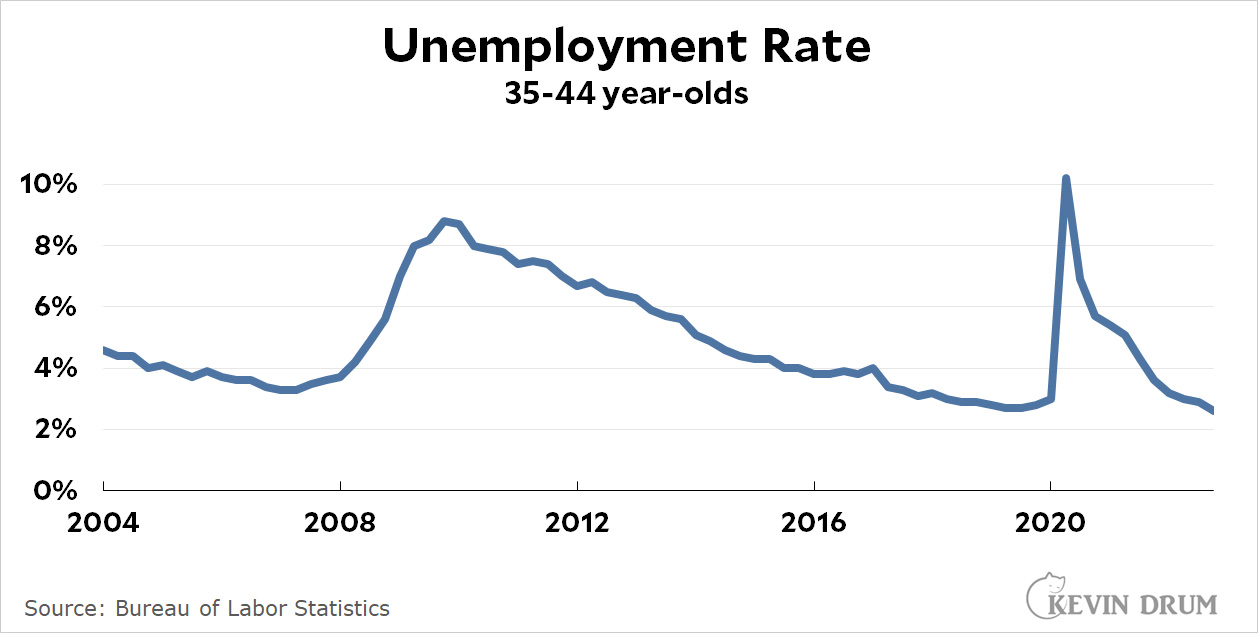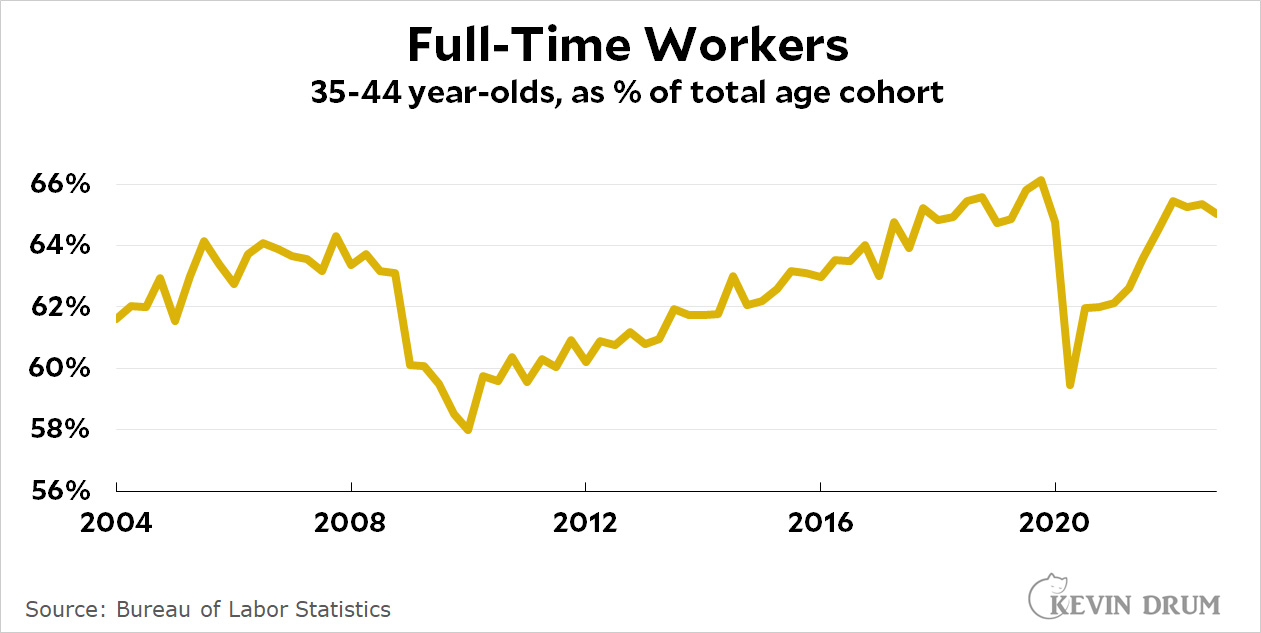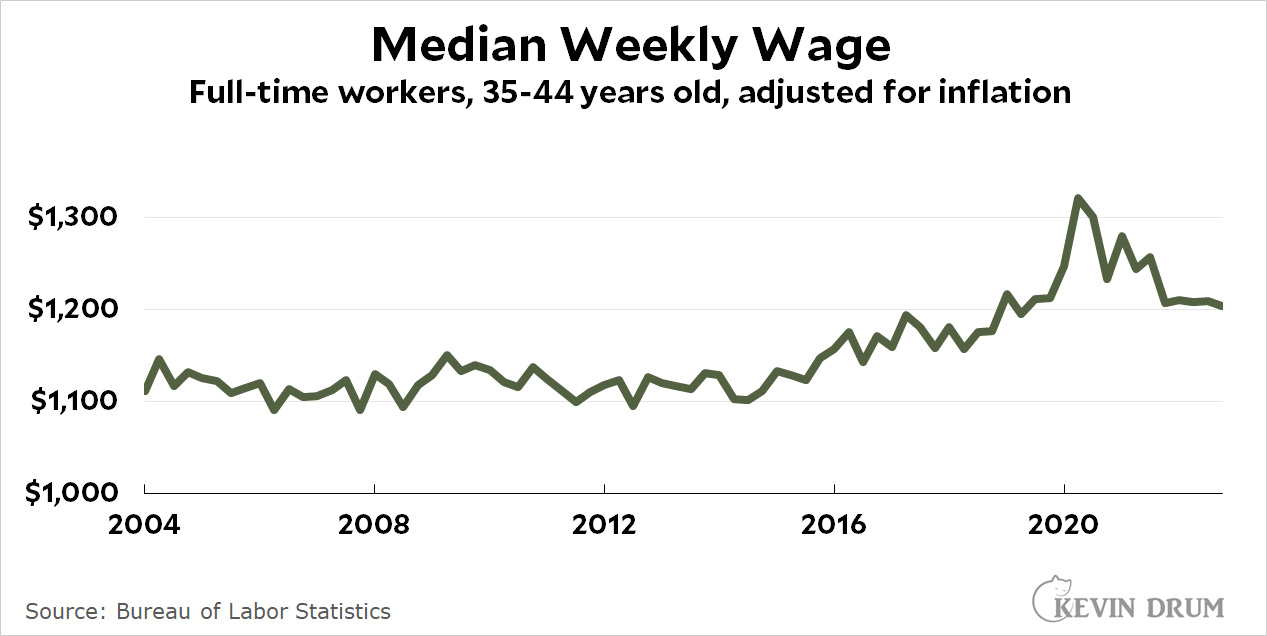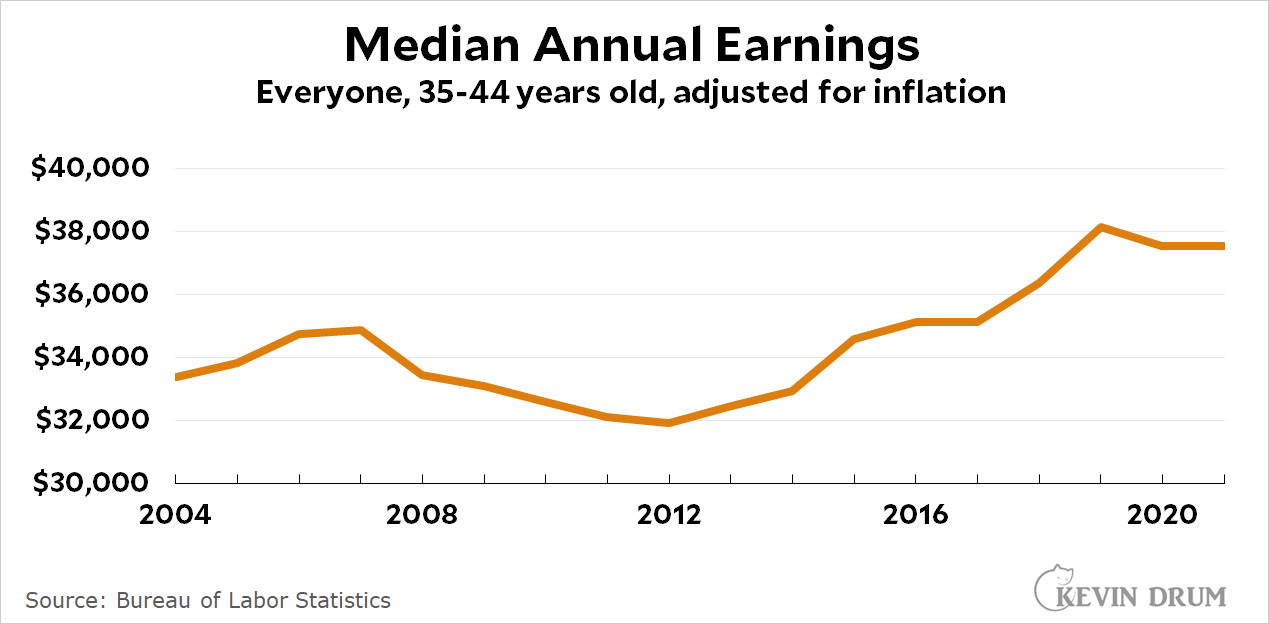Over at Vox, Alissa Wilkinson peddles an increasingly stale meme:
It’s important for the purposes of this article that you know my age: I am on the verge of turning 40. Having been raised in that brief interregnum between the Cold War and the war on terror, I, like many of my peers, assumed that I would live my life in a stable economy and relatively peaceful geopolitical context. I’d go to college, get a job, and then enjoy a gradually increasing salary, benchmarked to a gradually increasing cost of living. Everything would be pretty normal.
Ha! Ha ha ha!
My adult life has been marked by national and global catastrophic events, recessions, and the growing realization that the stability my parents and grandparents had at my age is vanishingly rare. It’s become distressingly clear that the gig jobs my peers and I relied on to make rent in our mid-20s — but assumed we’d ditch, eventually — have evolved into the only jobs, not stopgaps but survival necessities.
This is true for some people. It's always true for some people. But as a general description of 30-somethings, it's just flat wrong.
Here's the unemployment rate for 35-44 year-olds:
 Like everyone, this age group really did suffer through the Great Recession. However, right now their unemployment rate is 2.6%, as low as it's ever been.
Like everyone, this age group really did suffer through the Great Recession. However, right now their unemployment rate is 2.6%, as low as it's ever been.
But the unemployment rate can be deceiving since it doesn't distinguish part-time and gig workers from full-time workers. So here's full-time employment for 35-44 year-olds:
 Once again, it's as good as it's ever been for this age group. But are these just McJobs? Let's take a look at what they pay. Note that this is solely for full-time workers:
Once again, it's as good as it's ever been for this age group. But are these just McJobs? Let's take a look at what they pay. Note that this is solely for full-time workers:
 Full-time workers are being paid more today than full-time workers of 20 years ago. Now here are median annual earnings for everyone in the 35-44 age group (full-time, part-time, and unemployed):
Full-time workers are being paid more today than full-time workers of 20 years ago. Now here are median annual earnings for everyone in the 35-44 age group (full-time, part-time, and unemployed):
 This is for individuals, not families or households. As with the full-time chart, annual earnings are higher now for 35-44 year-olds than they were 20 years ago.
This is for individuals, not families or households. As with the full-time chart, annual earnings are higher now for 35-44 year-olds than they were 20 years ago.
None of this is to say that this age cohort has no legitimate gripes. It took them several years to rebound from the Great Recession. Some of them—about a quarter—still have outstanding student loan debt that averages around $20,000 and costs them $3,000 per year.¹ And jobs in the arts, as always, are poorly paid and in short supply.
And of course, some of them are just plain not doing well. But that's not unique to this age cohort. Every generation has its share of rich and poor.
The overall picture is pretty plain: on average, 35-44 year-olds are doing as well or better than their parents at that age. It took too long, and I'd prefer it if they were doing better still, but the stereotype of the gig-job millennial is long out of date. Right now, they're doing just fine.
¹These are median figures. Means are higher because they're skewed by enormous student loans taken out by business, law, and medical students, as well as undergrads who attended expensive elite universities.

This article arrives immediately after "corporate profits are at an all time high at the expense of workers" and yet your argument seems to shift. Alissa's argument (as I see it) is that her career is a treadmill - any gains made (even relative to other generations) won't be enough to "get ahead"
Alissa's argument (as I see it) is that her career is a treadmill - any gains made (even relative to other generations) won't be enough to "get ahead"
Gig jobs probably are a necessity in some fields, that's true. I'd imagine it's tough trying to make a go of a career in journalism these days, especially given the fact that the biggest concentration of such jobs are in our most expensive metros.
I also think there's less stability for a lot of workers than was the case 50 years ago. (See Hacker, Jacob, "The Great Risk Shift"). But I'm not sure! Defined benefit pensions are practically unheard of in 2023. Once they were common. Kevin's numbers focus on wages and the overall job market. Those numbers are pretty strong, and perhaps don't capture the precariousness of the modern economy for the non-rich. I'm not sure what kind of numbers are out there to examine this phenomenon. Total number of months of joblessness workers at age 50 have experienced over last 20 years? Projected retirement income for current 45 year-olds as a percentage of median household income? Median out of pocket medical expense for non-elderly households? Median housing expenditure as a percentage of median household income for the 20 largest metros? I can think of the kinds of numbers that would be interesting to examine, and might give us a sense of the "precariousness" situation. But I haven't looked.
Income and jobs don't tell the story, I reckon. That said, people trying to make it in non-STEM fields in pricey cities aren't necessarily a highly representative bunch of folks. As with most things, it's probably complicated!
I think this is right. Time was, you could move to a big city like NY or LA after college, find a cheap apartment in some bohemian neighborhood and hustle at whatever you were doing until you got your big break. Except that now that East Village apartment building where the musical Rent was set has been converted to a co-op that costs $1 million a unit.
Why is "getting a big break" important? That's precisely why adults have so much contempt for these sorts of stories.
You can (and most people do) live perfectly good and happy lives as average human beings doing average jobs. A sensible person does not fantasize that they can move to LA with a buck in their pocket and become a movie star in three weeks. A sensible person appreciates that there are jobs and lives to be found in Cleveland or Davis or St Paul, and that the real pathology of America is telling kids that everyone is a star just waiting to be born.
I’m currently generating over $35,100 a month thanks to one small internet job, therefore I really like your work! I am aware that with a beginning cdx05 capital of $28,800, you are cdx02 presently making a sizeable quantity of money online....
.
.
Just open the link————->>> http://Www.Coins71.Com
I'm going to out myself as a member of the cohort under discussion here. The issue is not unemployment and income as such, it is unemployment and income as they relate to a bunch of other things: paying off educational debt, homeownership, the ability to have a family, all the things that more or less attach to the concept of "middle class."
The particular cause for resentment is also how different our experience of this period of young adulthood into early middle age is relative to the experiences related to us by our parents as they went through this period.
Finally, there is the issue of boomers "pulling up the ladder after them." (I tend to think this is a less-than-charitable read of the situation but y'all need to sell the 4BR houses you bought in the 1980s, downsize, and retire--for real.)
We can debate whether this is "real" or not in empirical terms at the population level until the cows come home. (See also Kevin's contention that there is no housing shortage because on a national level there are enough houses, which persistently elides a bunch of factors that actually matter.)
Politically speaking, it is "real" in the sense that people my age feel it in their bones.
Kevin's (correct) argument is that Alissa is not the world.
She is welcome to say how life sucks for here personally, or for her friends, or perhaps even (if she's willing to provide the data) for those in (what counts these days as) journalism and similar professions.
What she is NOT welcome to do is claim that her unhappy experiences correspond to the entirety of the US (and by implication that they deserve a political response, are not the result of choices she made, etc etc)
Woke doom and gloom cannot fail. It can only be failed.
Arguments over "woke" can never stop arguing about "woke" even though it's literally not on the table here.
Could be that journalists in that age range are inclined to feel that way.
Let’s see…
1. When I was 3, the Soviet Union invaded Hungary.
2. When I was 9 the world came closer to nuclear war than at any time before or since. I could tell my parents were scared shitless, though I didn’t understand why because they didn’t tell me. Since they were, I was.
3.. By the time I was 14, I was sure that when I turned 18, I would be required by my government to fight and possibly to die in a seemingly unending war on the other side of the planet. Only the luck of a high lottery number prevented that.
4. When I was 15, the Soviet Union invaded Czechoslovakia.
There’s more…
Geopolitical stability? Ha!
At home, when I was 15, a presidential candidate was assassinated, another gravely wounded (and paraplegic for life), and one of the greatest civil rights leaders was assassinated.
In the same time frame, cities were burning, literally and widely.
I’ve lived through inflation at 14% and mortgage rates at 18%, through housing market crashes and booms, and stock market crashes and booms.
Stability at home? Ha!
I’m not complaining. This is life. We all do the best we can.
Anyone who has the expectation, let alone feeling entitled to, a peaceful and increasingly prosperous life is at best naive.
My parents lived the same timeline. Only my Dad did get drafted.
Neither have even an ounce of envy for their Millennial children.
But YMMV
I'm a year younger than you, and you've nicely summarized my reaction.
Yes, the Millennial generation is facing new problems, and yes, those problems absolutely should be addressed; I'll be an ally in the effort to the extent that I can. But no one who lived through the 1960s and 1970s looks back on them as the era of stability.
Wilkinson says she had hoped that "Everything would be normal." Unfortunately, that's what normal has looked like for the past century or so: New challenges, great uncertainty, and all the stress that goes with them.
Precisely! Articles like this that ignore history amount only to myopic, navel-gazing, self-pitying laments. For most, even in this country, life is challenging, always has been.
Very true.
I, like many of my peers, assumed that I would live my life in a stable economy and relatively peaceful geopolitical context. I’d go to college, get a job, and then enjoy a gradually increasing salary, benchmarked to a gradually increasing cost of living. Everything would be pretty normal.
I think there are two (or three) ways to think about this.
1. Her biggest problem is her assumptions. Where'd she get the idea that her life would be smooth with nothing to get ruffled about? I hear a lot about privilege but rarely is it stated so blatantly.
2. The "stable economy" and "relatively peaceful context" may seem to be nonexistent. But only if you know nothing about history. Despite all the worries of the past few decades, it has been a time of stability and relative peace. It only looks bad compared to an idealized fantasy of what it should have been.
(3.) When I was young, I didn't want "everything to be pretty normal." Pretty normal was what my generation was rebelling against.
They are just repeating all of the economic doom and gloom that the Elizabeth Warrens and Bernie Sanders have been feeding them. Yes, inequality is getting worse. Yes, rich people get away with too much stuff. But there's also good economic news.
So, like if you're doing well you have to keep saying everyone else is doing shitty so as not to sound like you don't recognize that even if everyone you know is doing a bit better.
The fucking pandemic fucked up the economy less bad than Bush.
The case for "living standards have stopped climbing" or "the economy sucks" is pretty weak. Kevin touches upon that in this post.
I do think there's a very strong case for "We're not doing nearly as well as we should" (with specific refernce to economic inequality: that really has increased pretty dramatically since 1980).
But I doubt the "doom and gloom" narrative sells the solutions we need. Outside of the Great Depression*—which really was uniquely bad—the big safety net expansion in the US mostly got accomplished in the 1960s, when the economy was booming, and while, despite plenty of problems, the "liberal vision" on domestic reforms was mostly sold via a postive, expansive, aspirational narrative.
*And even there, the primary salesman of the New Deal was largely a sunny, optimistic figure.
Yes, but the "doom and gloom" narrative enables one to archly reference Late Stage Capitalism and other learned-sounding-but-enervating shibboleths, which is much easier than grappling with actual reforms.
Actual reforms like what? It's called Late Stage Capitalism because it describes an ossified, financialized, legalized, ultra-complex system in which reform is nigh impossible. Even good-government liberals are writing in the law journals and NYT how they are paralyzed to do anything about anything because their own regulations, community interest groups and the courts have become impediments to even the smallest changes.
it describes an ossified, financialized, legalized, ultra-complex system in which reform is nigh impossible.
Reform may be impossible in the Madisonian USA, but that's not necessarily the case in other high income countries, which suggests to me it's not so much "late-stage capitalism" as "a really fucked up constitution's chickens are finally coming home to roost."
There's no such thing as 'late stage capitalism'.
If someone has a time machine and can share that with us, that would be great, but until they do that it simply sounds like utter hogwash, whatever it is it may be said to describe.
Exactly.
Spätkapitalismus (Sombert), or late capitalism, is what they were calling it more than a century ago. And what followed that time of late capitalism? More capitalism.
A hundred years from now, our generation's yet-to-be-born great-grandkids will be calling it Late Capitalism, and a hundred years later their yet-to-be-born great-grandkids will be smirking.
"Actual reforms like what?"
Minimum wage increases, card check, health care universalization, antitrust, parental leave, etc. There are lots. And progress on many of them is very possible and/or actually happening.
"It's called Late Stage Capitalism because it describes an ossified, financialized, legalized, ultra-complex system in which reform is nigh impossible."
Shibboleths noted. Thank you for demonstrating my point.
That to-do list should come with a vintage 'Vote or Die!' long-sleeved men’s t-shirt
Another day, another Kevin Drum article saying that everything is ok from the perspective of a retired software engineer. The responses are the same:
- Yes median wages have gone up $400 a month over 20 years, but health insurance premiums for single people have increased by $375 (KFF.) ((Note: Report does not say normalized or nominal, and I'm an internet shlub.)
- So that leads $25 a month improvement since 2000. But wait, deductibles have gone up $700 in the last 10 years. Suddenly we're now at -$25 or so.
- Surely home prices in the areas that we desire to live are affordable. Nope, the percentage of yearly salary that covers a new home price keeps dropping.
- Add in cellphone and internet bills, which are shockingly high for stagnant service in our country.
It is quite possible that things are the same, but Kevin shouldn't be so glib in assuming so after a first run analysis. For me personally, I have the same profession as my father, and have the same nominal salary 20 years after he retired. It would take a real economist lots of time to actually track what disposable income really is, and I'd be shocked if it has consistently grown over the past 50 years.
It's particularly galling to be told "everything is fine," by a retired homeowner in SoCal, the latter part of which is basically an unreachable goal for most members of my generation.
A couple of days ago Kevin showed the graph of steadily and substantially increasing GDP which he claimed was good. Today he shows the slight gain in real wages over the last 20 years (omitting the actual decline over the previous 30 years) and that is also good. These things are probably OK if you believe in trickle-down economics and that people at the lower end should be grateful for any gains, but this is not the way things were before the 70's. Up till then people at the lower end had real hopes of advancement.
This increasing inequality is not a phenomenon of the nineties or later, but it is a continuing source of grievance. Or it should be, if people weren't distracted by culture wars.
this is not the way things were before the 70's. Up till then white people at the lower end had real hopes of advancement.
FIFY
Google paid 99 dollars an hour on the internet. Everything I did was basic Οnline w0rk from comfort at hΟme for 5-7 hours per day that I g0t from this office I f0und over the web and they paid me 100 dollars each hour. For more details visit this article... https://createmaxwealth.blogspot.com
Kevins response completely ignored what i thought were the 3 main arguments of the article.
1 Lack of job stability
2 Prevelance of gig jobs
3 Difficulty in living, working, building careers and families through the worst economic recession/recovery since the 1930s and the worst pandemic since the 1930s.
Saw a lot of the 'old guy with money tells kids to ignore the recession/pandemic and stop whining' elsewhere, glad Kevin is jumping in.
Well, no, what he did was contrast Wilkenson's anecdata with a broader set of data that calls into question whether her experience is really that of most millennials, or mainly a subset of them in journalism where, yes, employment tends to be increasingly unstable gig-work.
The original author states that she is only talking about herself to help set the stage for her review of a TV show.
Nowhere does she say that this representative of most Americans or the general economy.
Kevin makes that leap and pretends she is talking about everyone...but he still manages to fail to address the points she made. He does throw data at the wall, but it doesnt address the prevelance of gig jobs or the lack of job stability or the fact that the Great Recession and the Covid pandemic were big freaking deals.
You are absolutely horrible when it comes to mental health. All you do is downplay and dismiss other people's suffering. You might want to avoid speaking to kids and young adults.
Where did KD dismiss anyone's mental health struggles?
“At Vox, we believe that clarity is power, and that power shouldn't only be available to those who can afford to pay for a subscription. That's why we keep our work free. Millions rely on Vox's clear, high-quality journalism to understand the forces shaping today's world. Support our mission and help keep Vox free for all by making a financial contribution to Vox today.”
Any takers?
I think they just had to lay off a bunch of staff.
Any time I hear someone think the world is uniquely terrible at the moment I pick up some history books at the library and remind myself what real problems look like. I think of my father listening to Roosevelt announcing a "Day of Infamy" and knowing his dad was going off to fight, or I remember comparing lottery numbers with my friends during Vietnam. Or, I remember vividly the nuclear attack drills in grade school where we crammed our little bodies into the lockers in the hallway, as if that would do any good. Nothing partitucarly unique about today stands out to me other than the return of good old Mussolini-like fascism as an aspiration on the right. I thought we had buried that old trope. One thing that is different today is that aspirations and expectations for many are sky high compared to what we had in the past. No cell phones, no microwaves, no new cars, no computers, no a/c for many of us, no jetting off on vacations, no eating out all the time. The first fulltime job I held down I worked an average of 60 hours a week for $1.65 an hour, with no benefits of any sort. Yes, each generation has its own challenges and advantages, but I don't see today as a particularly bad time.
And of course, some of them are just plain not doing well. But that's not unique to this age cohort. Every generation has its share of rich and poor.
I think the difference this time around is that a cohort of people, namely college graduates trying to break into arts/entertainment/publishing/journalism industries in big cities are finding it increasingly difficult to establish their careers and they can also write about their experiences, so theirs are the ones we know about. The costs of two things that were reasonably affordable for their parents' generation, even in places like NYC, namely college and housing, are now prohibitively expensive. Add to that stuff like childcare, health insurance, etc., and there's no doubt that for a certain subset of millennials, particularly those who came from rather well-to-do families to begin with and assumed they would still be better off than their parents, particularly if they went to a fancy college, and want to live in an expensive coastal city, are pretty frustrated with how things turned out.
What we don't hear about is the 40 year-old living outside Minneapolis who graduated high school, went to JC for a year or two, and started a successful home remodeling business, bought a cheap fixer-upper house, makes a good living and, you know, can't complain.
Ford files patent for self-driving cars that repossess themselves,
https://futurism.com/the-byte/ford-patent-cars-repossess-themselves
How well do the median annual earnings -- $37k -- hold up against median expenditures.
And what is the job market in the places where that income is sufficient
Median annual earning in the US are about $54K for full time workers.
https://www.bls.gov/news.release/pdf/wkyeng.pdf
Median household income is around $70K.
The pandemic profiteering chart better explains why American workers feel they should be doing better than they are.
I mean you love charts and data. I have to assume you've looked at home cost to income ratios and health care cost to income ratios over time. I won't even factor in education cost to income ratio, since that is more "optional," sort of.
Any older person looking down on millenials for complaining about current conditions needs to address these points before I take them seriously.
Reading this after the conservative fear one, I can't help but think that, at least among young people, the key is catastrophizing. Climate, economic, political.
🙁